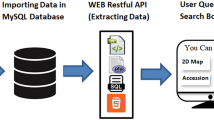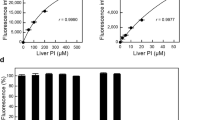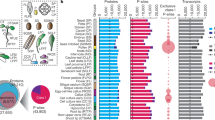Abstract
ACCORDING to the classical and perhaps most generally accepted theory of protein synthesis in plants the amino-acids are intermediates in a process which proceeds after the pattern first outlined by Emil Fischer in the well-known polypeptide theory. On other views the amino-acids are regarded rather as the products of protein hydrolysis and as the form in which soluble nitrogen may be stored and eventually mobilized when synthesis proceeds1. Whichever of these views is held, it is a commonplace that free amino-acids are widespread in plants and they are known to exist dissolved in the cell sap, to which they contribute part of the buffering properties which titration curves reveal. This is neither the place nor the occasion to give the number of free amino-acids which have been identified in plant materials.
This is a preview of subscription content, access via your institution
Access options
Subscribe to this journal
Receive 51 print issues and online access
$199.00 per year
only $3.90 per issue
Buy this article
- Purchase on Springer Link
- Instant access to full article PDF
Prices may be subject to local taxes which are calculated during checkout
Similar content being viewed by others
References
Steward, F. C., Ann. Rev. Biochem., 16 (1947).
Consden, R., Gordon, A. H., and Martin, A. J. P., Biochem. J., 38, 224 (1944).
Dent, C. E., Lancet, 637 (Nov. 2, 1946).
Dent, C. E., Biochem. J., 41, 240 (1947).
Dent, C. E., Conference on Liver Injury (Josiah Macy, Jr. Foundation), Sixth Meeting (May 1–2, 1947).
Dent, C. E., Science, 105, 335 (1947).
Partridge, S. M., Nature, 158, 270 (1946).
LaCour, L. F., and Drew, R., Nature, 159, 307 (1947).
Steward, F. C., and Preston, C., Plant Physiol., 15, 23 (1940).
Steward, F. C., Wright, R., and Berry, W. E., Protoplasma, 16, 599 (1939).
Poison, A., Mosley, V. M., and Wyckoff, R. W. G., Science, 105, 603 (1947).
Author information
Authors and Affiliations
Rights and permissions
About this article
Cite this article
DENT, C., STEPKA, W. & STEWARD, F. Detection of the Free Amino-Acids of Plant Cells By Partition Chromatography. Nature 160, 682–683 (1947). https://doi.org/10.1038/160682a0
Issue Date:
DOI: https://doi.org/10.1038/160682a0
This article is cited by
-
The paths of Andrew A. Benson: a radio-autobiography
Photosynthesis Research (2017)
-
The influence of chlorsulfuron herbicide on GABA metabolism and oxidative damage in lentil (Lens culinaris Medik) and wheat (Triticum aestivum L.) seedlings
Acta Physiologiae Plantarum (2015)
-
Glutamic acid decarboxylase gene disruption reveals signalling pathway(s) governing complex morphogenic and metabolic events in Trichoderma atroviride
Antonie van Leeuwenhoek (2013)
-
Recollections
Photosynthesis Research (1993)
-
The effect of mineral nutrition on the distribution of free amino acids in tubers of cv. Gari
Potato Research (1975)
Comments
By submitting a comment you agree to abide by our Terms and Community Guidelines. If you find something abusive or that does not comply with our terms or guidelines please flag it as inappropriate.



